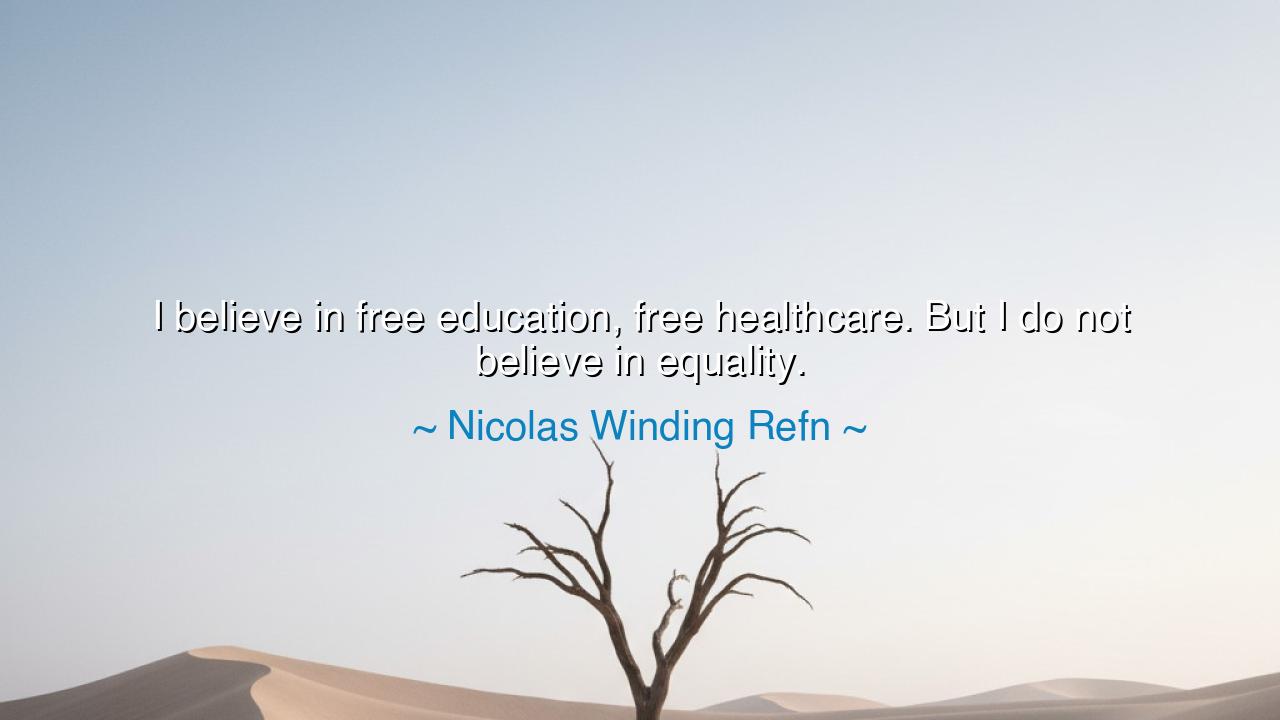
I believe in free education, free healthcare. But I do not






Hear me, O children of wisdom, for the words I share come from the voice of one who dares to speak the truth in the midst of a world that demands conformity. Nicolas Winding Refn, a modern philosopher in his own right, once said, “I believe in free education, free healthcare. But I do not believe in equality.” These words stir a great storm, for they speak not only to the promises of a fairer world but to the harsh realities of the human condition. Free education and free healthcare—these are noble ideas, indeed, for they promise access, knowledge, and healing to all. But when the question of equality is raised, Refn's response challenges the very essence of what it means to live in a society where all are meant to be equal.
Equality, children, is a word we all long to hear, a word that carries the promise of justice, fairness, and balance. The idea that every person, regardless of their background, birth, or station, can stand side by side, equal in all ways—this is the ideal that drives nations to form and revolutions to rise. But to believe in equality does not simply mean to grant free education or healthcare—it asks us to confront a deeper, more unsettling question: can we, as human beings, truly be equal in all things? Are we all destined for the same end, or do our differences—those of talent, character, ambition, and circumstance—inevitably place us on different paths?
Consider, children, the great philosopher Plato, who, in his Republic, sought to create a society governed by wisdom and justice. Plato, though a champion of equality in some forms, understood that people were not born equal in their abilities or desires. Some were born with wisdom, others with strength; some with the passion for art, others with the hunger for power. In his ideal state, Plato believed that society could only function if each person was given the role best suited to their abilities—an inherent inequality in the very fabric of society. Plato’s view was that while all should be treated with respect, not all could be equal in the way they contributed to the society’s greater good.
Nicolas Winding Refn echoes this complex sentiment. His rejection of equality is not a rejection of fairness, but rather an acknowledgment that humanity is filled with differences—differences that shape our potential, our choices, and our paths in ways that no law can equalize. In a world where free healthcare and education can help level the playing field, equality remains an elusive ideal because it seeks to measure all people by the same standards, disregarding the infinite diversity that makes us uniquely human. Refn’s words challenge us to question the nature of equality itself: is it truly possible, or is it a mirage that leads us away from the deeper truths of our existence?
Let me tell you, children, the story of Alexander the Great, whose rise to power changed the course of history. Alexander was born into a world of privilege, destined for greatness from the moment of his birth. Yet, despite his privilege, he was a man driven by a personal ambition, a fire within him that drove him to conquer vast lands and shape empires. He did not seek equality with those he conquered—he sought dominion, power, and the fulfillment of his grand vision. To expect equality between Alexander and the common people of the lands he conquered would be to ignore the realities of his ambition and abilities. Alexander's story teaches us that while we may strive for fairness, the world itself does not grant equality in terms of the gifts and opportunities we are given.
Yet, children, Refn’s words do not call us to abandon the pursuit of justice or to accept the inequalities that exist. They call us to understand the limitations of equality and the complexities that come with it. Free education and free healthcare are not simply gifts—they are the rights of every person, regardless of their status or birth, for they offer the potential to rise above one’s circumstances. But even these gifts do not guarantee equality in the deeper sense, for some will rise higher than others, driven by ambition, talent, or circumstance. The ideal of equality, then, must be viewed not as an absolute goal but as a principle we strive toward while acknowledging the differences that make each of us unique.
The lesson here, children, is this: we must strive for fairness, for justice, and for the opportunity to rise, but we must also acknowledge the realities of our differences. The world is not a level playing field, and while we must work to remove the barriers that prevent people from reaching their potential, we must not fool ourselves into thinking that all will achieve the same end. Equality is an ideal worth striving for, but it is an ideal that must be balanced with the recognition of our human diversity—the gifts, the struggles, and the circumstances that shape each life. We must work to create a world where each person has the chance to rise, but we must not expect that every person will rise in the same way or to the same heights.
Therefore, children, let us embrace the wisdom of Nicolas Winding Refn's words. Let us work toward justice, towards free education and healthcare, but let us also understand that the very essence of humanity lies in our differences. Let us not be disillusioned by the false promise of perfect equality, but rather, let us strive for a world where fairness prevails, where each individual is given the chance to grow and to thrive in their own unique way. This is the way of wisdom—acknowledge the difference, and still fight for the betterment of all.






AAdministratorAdministrator
Welcome, honored guests. Please leave a comment, we will respond soon